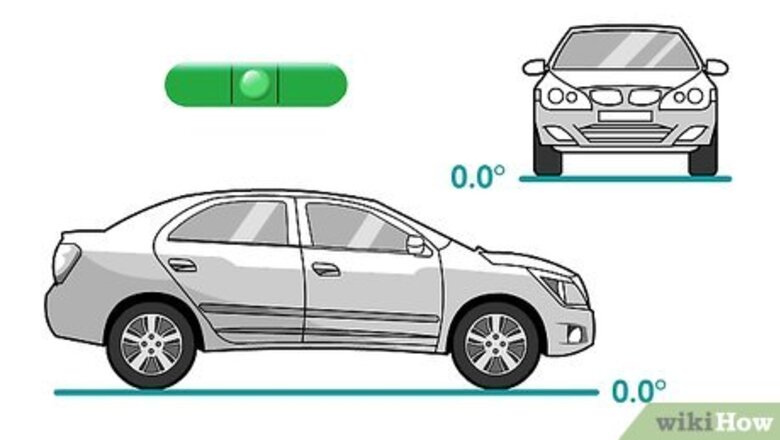
views
Lifting Your Vehicle
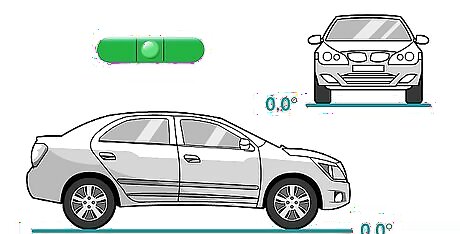
Find a flat, level surface to park your vehicle. Work on a clean, paved area so your vehicle is on even ground. Avoid jacking your vehicle in a place that's bumpy, near heavy traffic, or covered in gravel. Make sure each side of your vehicle is level so the jack or jack stands can't slip out from underneath it. Working in a garage or a flat driveway is the best place to lift your vehicle.
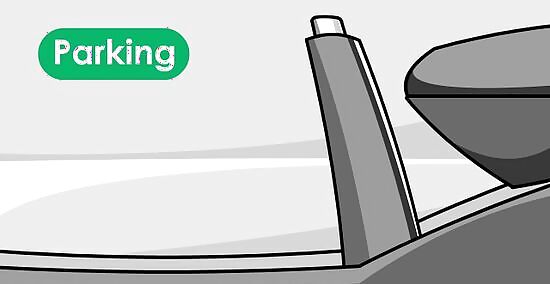
Activate your vehicle's parking brake. Find the lever in your vehicle that controls your parking brake and pull it until it's activated. The parking brake will ensure your vehicle doesn't lurch forwards or backwards while you jack it. Place chocks, or tire wedges, around each of your wheels if you're lifting up the back end of your car. If you don't have tire wedges, you can use 2 in × 4 in (5.1 cm × 10.2 cm) boards in front of and behind your wheels.
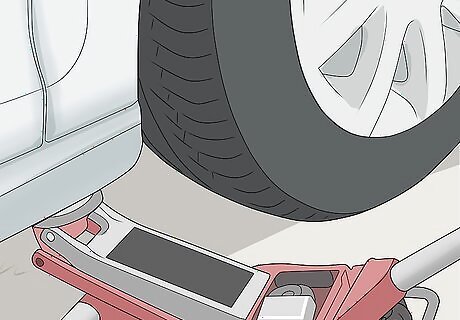
Locate an area underneath your vehicle to place your floor jack. Use hydraulic floor jack for the safest way to lift your vehicle. Slide the floor jack underneath your vehicle so the arm is underneath the frame of your vehicle or at a lift point. Don't use a scissor jack since they are less stable and only meant for emergency situations like changing a tire. Consult with your vehicle's manual to determine the best place to jack it. Common Places to Jack Your Vehicle Look for tow hooks on the front or back of your vehicle. Use the stabilizer bars directly behind the vehicle's wheels.
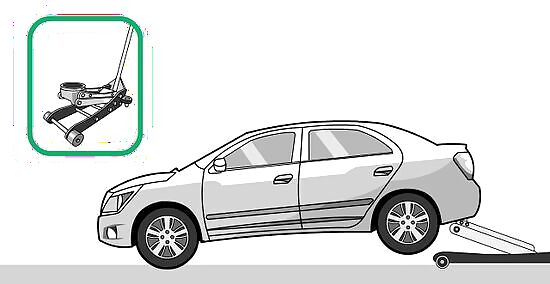
Raise your vehicle so the tires are 2–3 in (5.1–7.6 cm) off the ground. Crank the handle up and down to lift your vehicle off of the ground. Continue lifting your vehicle until the tire or tires closest to your jack are completely off the ground. Don't lift your car higher than you need or else it could be unstable on the jack.
Placing the Jack Stands
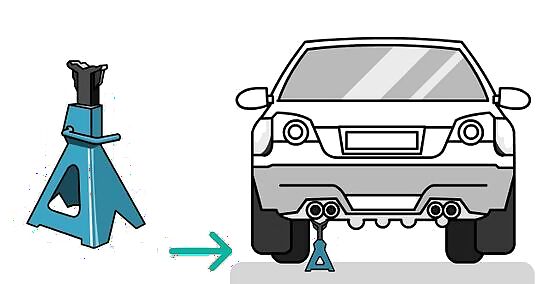
Set the jack stand underneath the pinch points of your vehicle. The pinch points are located on the sides of your vehicle behind your front tires or in front of your rear tires. Slide your jack stand in from the side of your vehicle. Line up the divot on your jack stand with the part of the pinch point that extends down. If your vehicle doesn't have pinch points, set the jack stands underneath the vehicle's frame. Don't crawl underneath your vehicle while it's jacked until you have stands secured in place.Tip: Check the weight of your vehicle in the manual or online. Make sure your jack stands can support that amount of weight before using them.
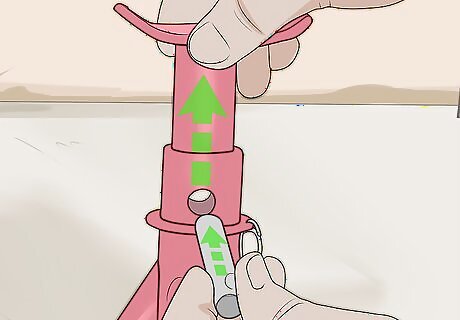
Adjust the height of the jack stand if you need to. If you have an adjustable jack stand, lift the top of the jack stand up until it's touching the pinch point on your vehicle. Once you've changed the height of the stand, put the safety pin attached to the stand through the hole at the base to secure it place. That way, it won't fall down when the weight of your vehicle is placed on it. Always place the safety pin in your jack stand, or else the vehicle could fall on top of you while you're underneath it. Some jack stands cannot be adjusted. If yours doesn't change height, you can skip this step.
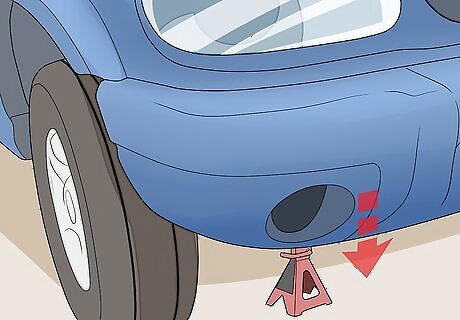
Lower your vehicle slowly onto the jack stand. Slowly turn the lever on your floor jack counterclockwise to drop your vehicle back down. The jack stand will support the weight on the side of your vehicle so you can safely work underneath it. Pull the jack out from underneath your vehicle. If you have room underneath your vehicle, keep the jack in place for additional security.
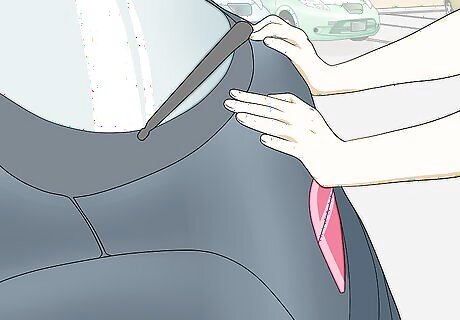
Push your vehicle slightly to make sure it's sturdy. Give your vehicle a small nudge to see if it moves around or shifts its weight. The jack stand and your vehicle shouldn't move when you push it. If it does, avoid going underneath the vehicle and try to place the jack stand in a new area.
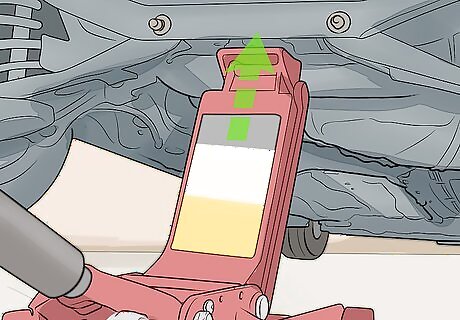
Place additional jack stands to lift your vehicle completely off the ground. Continue jacking up your vehicle on each side and sliding jack stands underneath the pinch points. Make sure the stands on opposite sides are straight across from one another so your vehicle is sturdy. Once you've placed the jack stands you need, you can start working underneath your vehicle. Make sure any adjustable jack stands are the same height so your vehicle doesn't sit crooked.
Removing the Stands
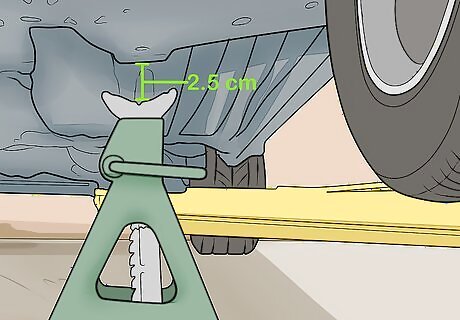
Raise your vehicle 1 in (2.5 cm) above your jack stand. When you're finished working, roll your floor jack back underneath your vehicle so it's in line with the lift point you used. Crank the lever up and down to lift the vehicle up so you can pull out the jack stand easily.
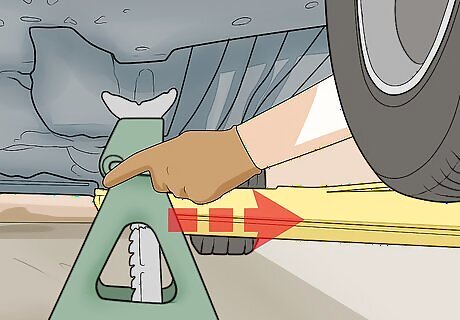
Pull the jack stand out from the side of your vehicle. Reach underneath your vehicle from the side and slide your jack stand out. Don't crawl underneath the front or back of your vehicle while removing jack stands since it's only being supported by the jack. Don't adjust the height of your jack stand until it's out from under your vehicle.
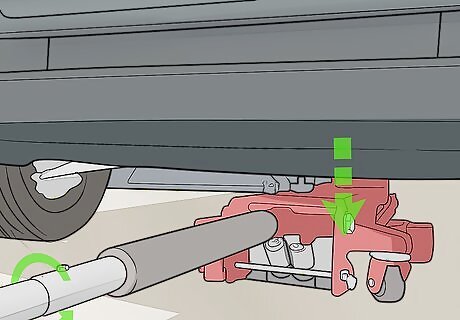
Lower the jack until your vehicle is back on the ground. Turn the lever on your floor jack counterclockwise to slowly lower your vehicle. Once your tires are back on the ground, roll your jack out from under your vehicle. Hold the lever on your floor jack low to the ground so the bottom of your vehicle doesn't bump into it.
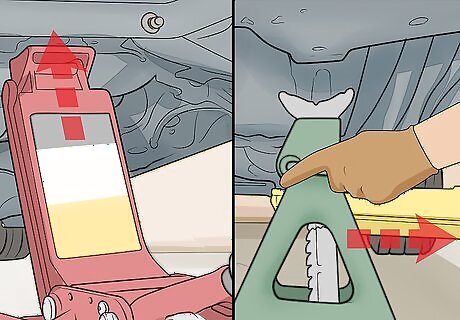
Continue to lift your vehicle and remove the stands until you've got them all. Place your jack underneath the lift points and raise your vehicle on each side if you need to remove additional jack stands. If you jacked your vehicle completely off the ground, remove both of the jack stands from the front before removing the ones in back.




















Comments
0 comment